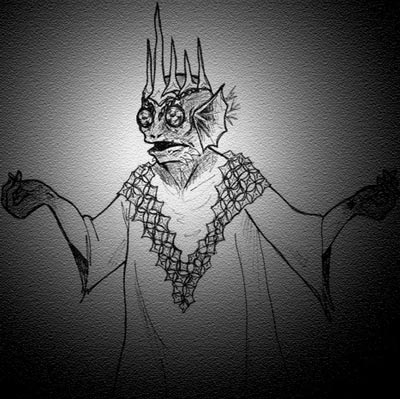
Page 6 of 6 |
|
A curious impulse made Elstead turn on his small glow-lamp again, so that he became visible to these creatures of the abyss, albeit the glare made them disappear forthwith into night. At this sudden sight of him, the chanting gave place to a tumult of exultant shouts; and Elstead, being anxious to watch them, turned his light off again, and vanished from before their eyes. But for a time he was too blind to mike out what they were doing, and when at last he could distinguish them, they were kneeling again. And thus they continued worshipping him, without rest or intermission, for a space of three hours. Most circumstantial was Elstead's account of this astounding city and its people, these people of perpetual night, who have never seen sun or moon or stars, green vegetation, nor any living, air-breathing creatures, who know nothing of fire, nor any light but the phosphorescent light of living things. Startling as is his story, it is yet more startling to find that scientific men, of such eminence as Adams and Jenkins, find nothing incredible in it. They tell me they see no reason why intelligent, water-breathing, vertebrated creatures, inured to a low temperature and enormous pressure, and of such a heavy structure, that neither alive nor dead would they float, might not live upon the bottom of the deep sea, and quite unsuspected by us, descendants like ourselves of the great Theriomorpha of the New Red Sandstone age. We should be known to them, however, as strange, meteoric creatures, wont to fall catastrophically dead out of the mysterious blackness of their watery sky. And not only we ourselves, but our ships, our metals, our appliances, would come raining down out of the night. Sometimes sinking things would smite down and crush them, as if it were the judgment of some unseen power above, and sometimes would come things of the utmost rarity or utility, or shapes of inspiring suggestion. One can understand, perhaps, something of their behaviour at the descent of a living man, if one thinks what a barbaric people might do, to whom an enhaloed, shining creature came suddenly out of the sky. At one time or another Elstead probably told the officers of the Ptarmigan every detail of his strange twelve hours in the abyss. That he also intended to write them down is certain, but he never did, and so unhappily we have to piece together the discrepant fragments of his story from the reminiscences of Commander Simmons, Weybridge, Steevens, Lindley and the others. We see the thing darkly in fragmentary glimpses--the huge ghostly building, the bowing, chanting people, with their dark chameleon-like heads and faintly luminous clothing, and Elstead, with his light turned on again, vainly trying to convey to their minds that the cord by which the sphere was held was to be severed. Minute after minute dipped away, and Estead, looking at his watch, was horrified to find that he had oxygen only for four hours more. But the chant in his honour kept on as remorselessly as if it was the marching song of his approaching death. The manner of his release he does not understand, but to judge by the end of cord that hung from the sphere, it had been cut through by rubbing against the edge of the altar. Abruptly the sphere rolled over, and he swept up, out of their world, as an ethereal creature clothed in a vacuum would sweep through our own atmosphere back to its native ether again. He must have torn out of their sight as a hydrogen bubble hastens upward from our air. A strange ascension it must have seemed to them. The sphere rushed up with even greater velocity than, when weighted with the lead sinkers, it had rushed down. It became exceedingly hot. It drove up with the windows uppermost, and he remembers the torrent of bubbles frothing against the glass. Every moment he expected this to fly. Then suddenly something like a huge wheel seemed to be released in his head, the padded compartment began spinning about him, and he fainted. His next recollection was of his cabin, and of the doctor's voice. But that is the substance of the extraordinary story that Elstead related in fragments to the officers of the Ptarmigan. He promised to write it all down at a later date. His mind was chiefly occupied with the improvement of his apparatus, which was effected at Rio. It remains only to tell that on February 2, 1896, he made his second descent into the ocean abyss, with the improvements his first experience suggested. What happened we shall probably never know. He never returned. The Ptarmigan beat over the point of his submersion, seeking him in vain for thirteen days. Then she returned to Rio, and the news was telegraphed to his friends. So the matter remains for the present. But it is hardly probable that no further attempt will be made to verify his strange story of these hitherto unsuspected cities of the deep sea. |
|
| Back | |
